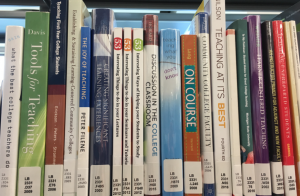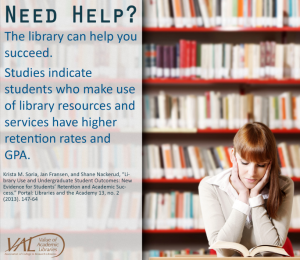Faculty Support
Course Reserve Policy
Course Reserve Form: https://eastcentral.libguides.com/coursereserve
Any faculty or staff member may request that an item be placed on Course Reserve. Submitting materials three days in advance of the date needed allows processing and timely availability to students. Instructor Reserve Collection form is required to place items on reserve. The form is available in the Library or online https://eastcentral.libguides.com/coursereserve
Course Reserves serve as supplemental study materials for student use. Supplemental study materials include items such as:
- Library materials: books, individual issues of journals & newspapers, DVDs, CDs, etc.
- Personal copies of books, journals, DVDs, newspapers, etc.
- Photocopies of book chapters and journal articles that meet fair use copyright guidelines.
- Old exams, lecture notes, and other items used to supplement a course.
It is recommended that one copy of each course reserve material be available for every fifteen students enrolled in the class.
Course Reserves loan periods are determined by the person placing the item on course reserves. Reserve loan periods are two days, seven days, twenty-one days, library use only or customizable.
Course Reserves are stored behind the Service Desk of the Library. Students will need to have the name of their instructor and/or class to access materials. A student ID is also required to use any Course Reserve materials.
Course Reserves are established for the duration of one academic semester. At the end of every semester items are removed from the Course Reserves collection and returned to their owner or their original library location, unless previous arrangements have been made. Personally owned materials may be picked up by the faculty member at the Service Desk or will be returned to their department or office.
Photocopies on Course Reserves
It is the policy of ECC Library to follow copyright law. Course Reserves are an extension of classroom activity and follow fair use, brevity, spontaneity and cumulative effect guidelines for classroom copying as stated in Guidelines for Classroom Copying in Not-for-profit Educational Institutions with Respect to Books and Periodicals.
Fair use:
- Purpose and character (non-profit, educational, personal, teaching, research, scholarship, criticism, commentary, news reporting)
- Nature of work (fact, published)
- Amount (small amount, not significant to work)
- Market effect (no major impact, one or few copies made, user owns copy of original work)
Brevity:
In general, instructors may place a photocopy of any of the following on reserves:
- One chapter from a book (less than 10% of book content)
- One article from a newspaper or journal issue
- One short story, essay, or poem
- One chart, diagram, or other graphic work from a published work
Spontaneity:
- Photocopy is made at the instance and inspiration of instructor
- Inspiration and use of work for maximum teaching effectiveness are so close in time that it would be unreasonable to expect a timely response from copyright owner.
- Photocopied material is only used for one academic semester
Cumulative effect:
- Photocopy is used only in one course
- Not more than two excerpts from works by the same author, nor more than three from the same collective work or journal issue.
- Each copy will carry copyright identification, bibliographic citation, and the following statement:
NOTICE: This material may be protected by copyright law (Title 17 U.S. Code).
Some works are outside of copyright law and can be freely copied without permission or royalty. These works include:
- Writings published before 1978 and never copyrighted.
- Published works whose copyrights have expired. Generally all copyrighted works dated before 1906 have expired. Any copyrights dated since 1906 may still be in effect. Information regarding copyright expirations may be obtained from the copyright holder (usually the publisher) or from the U. S. Copyright Office. (www.copyright.gov)
- U.S. Government publications.
Electronic Course Reserves
Electronic Course Reserves may also fall outside of copyright law; these include:
- Persistent links to library owned full-text articles
- Freely available web pages
Electronic Course Reserves links can be added to your Canvas course by using a permalink. See Library for questions on verifying the permalink is structured to allow off campus access.
The instructor placing materials on Course Reserves which exceeds fair use, brevity, spontaneity, and cumulative effect guidelines of copyright must seek permission from the copyright holder, usually the publisher. “Out of print” does not automatically imply permission. Sample letters for obtaining copyright permission are available in the Library or on the library web page. If permission is granted from the holder of the copyright, then proof of such permission should be presented to the Library upon submitting that material for course reserves.If copyright permission is not granted from the publisher, the Library can assist you with:
- Finding an alternative source to request permission
- Finding alternative material covering the same topic from a copyright free source
- Payment of royalty fees
The Library will request permission through the Copyright Clearance Center. As a courtesy, payment of fees charged by the Copyright Clearance Center will be paid from the Library budget. This courtesy may be subject to change pending budget impact assessment. Should permission from the Copyright Clearance Center be denied, that course reserve material will be removed from Reserves and the instructor will be notified immediately.
DVDs or Blu-ray on Course Reserve
An instructor may use a DVD or Blu-ray at any time if the following is true:
- It is a legal copy, professionally made.
- It supports the curriculum being taught.
- It is documented (in the syllabus).
- It is used in a face-to-face educational situation.
An instructor may not copy a video from VHS to DVD format without copyright permission.
Television Programs (off-air taping)
Off-air taping is defined as television programs provided without charge by local television stations for reception by the general public (e.g., ABC, NBC, CBS, etc.). An off-air taping may be captured if:
- It is used to support the curriculum being taught, only at the instructor’s request – fair use.
- It is used within the first consecutive 10 class days following taping and used no more than 2 times – fair use.
The instructor may retain (but may not show to students) an off-air tape for a period not to exceed 45 consecutive calendar days following the date of recording. After 45 consecutive calendar day the recording should be destroyed.
Educators may continue to use only those off-air recordings from cable and satellite programs that have been designated and cleared for educational use. Use is limited to all class sections within the course for which the recording was requested.
It is the responsibility of individual course instructors to adhere to the Course Reserve policy and its copyright guidelines.
May 31, 2024
ECC Library is here to provide the information resources and services that support the professional, educational and recreational pursuits of East Central’s faculty. In addition to friendly, helpful service we provide: course reserves, library research instruction, faculty research assistance, MOBIUS borrowing, and faculty liaisons for collection development.
Course Reserves
You may place personal or library copies of materials on reserve for student use each semester. These items are located behind the Library Service Desk and have restricted check-out periods of 2 hours, 2 days, 1 week, 4 weeks or customizable. Reserve materials may include but are not limited to books, DVDs, Blu-rays, CDs, journal issues, articles, old exams, or lecture notes. Some items may be restricted by Copyright Law, please review the Course Reserve Policy (above) for more information.
Accompanying form is available in the Library or online, Course Reserve Form: https://eastcentral.libguides.com/coursereserve. Please contact Hannah Jolley, x6559 to place items on Course Reserve.
Library Research Instruction
Library Research Instruction is available for classes your classroom and Rolla facilities. Faculty may arrange for a library research instruction in using the library catalog, articles and online resources, general internet searching, and more. Please schedule a few days in advance by contacting Morgan Spangler, x6552. Instruction tailored to your class is available; including length of class, library assignment, databases taught, optional library tour.
Recommendations for the Collection
Degreed librarians serve as faculty liaisons for collection development. Faculty are encouraged to make recommendations to their liaison and work alongside them in deselection items from the collection, commonly called “weeding”.
Liaison is Lisa Farrell (x6558) for subjects of:
| Culinary Arts Early Childhood Development Education Fine Art Music Theatre History Criminal Justice Political Science | Psychology Sociology Automotive Tech Building Construction Industrial Engineering HVAC/R Physical Education Precision Machining Welding |
Liaison is Morgan Spangler (x6552) for subjects of:
| Math Environmental Sciences Physical Sciences Biology Chemistry Business and Accounting CIS Economics Engineering Technology English Literature Journalism and Mass Media | Geography Geology Health Sciences HIM Medical Science Medical Assisting Nursing Occupational Therapy Assistant Paramedic Technology Radiologic Technology Philosophy and Religion Spanish |
Citations, publisher catalogs, book reviews, etc. are accepted. A suggestion box is also available at the Library Service Desk.
Library Research Assignments
Our #1 job is to help your students find the information resources they need. You are encouraged to provide the library with copies of your class research assignments. This will help us provide the best possible assistance to your students.
Faculty Research
Are you continuing your own education or need additional research assistance? Contact your liaison Morgan Spangler (x6552) or Lisa Farrell (x6558) to assist you with finding resources specifically for faculty.
Open Educational Resources aka FREE TEXTBOOKS
If you are interested in finding Open Educational Resources to replace your course textbook or as supplemental material contact Emerging Technologies Librarian Morgan Spangler (x6552) to assist you. The options are growing for texts, ancillaries, videos, etc. that are freely available to you and your students. There is also a stipend available for instructors that replace textbooks with a qualified resource.

Faculty Development Collection
The Faculty Development Collection is shelved within our general collection. Topics include curriculum evaluation, classroom management, tests and measurements, student development, etc. The selected items for this collection can be found searching the LOCATE catalog for Faculty Development.
Leisure Reading
This is where you will find current fiction and non-fiction bestsellers. For electronic books or digital audiobooks try Overdrive/Libby for a large collection of titles for your device mobile, kindle, or PC.


